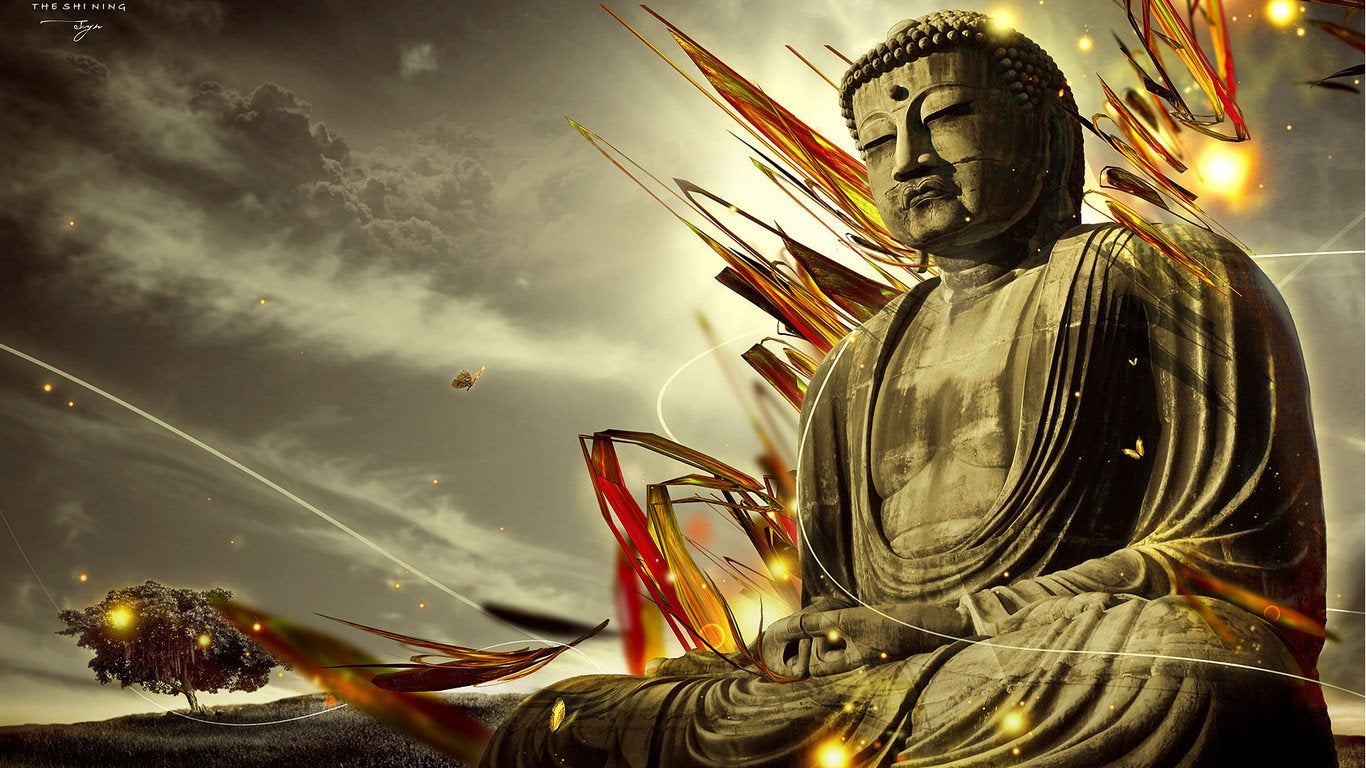Sūtra of the All-Encompassing Knowledge Store, the Heart of Prajñā-Pāramitā
Translated by: Rulu
***
Thus I have heard:
At one time the Buddha was staying on the Vulture Peak Mountain near the great city of Rājagṛha, together with 100,000 great bhikṣus and 77,000 Bodhisattva-Mahāsattvas. At their head were Avalokiteśvara Bodhisattva, Mañjuśrī Bodhisattva, Maitreya Bodhisattva, and others. They all had attained the Samādhi of Total Retention, abiding in the inconceivable liberation.
Avalokiteśvara Bodhisattva, seated in the multitude, rose and came to the Buddha. Facing the Buddha, he joined his palms and bent over respectfully. Gazing deferentially at the venerated visage, he said to the Buddha, “World-Honored One, I would like to pronounce in this assembly Bodhisattvas’ all-encompassing knowledge store, the heart of prajñā-pāramitā. I pray only that the World-Honored One will permit me to pronounce to the Bodhisattvas the secret tenets of the Dharma.”
The World-Honored One replied to Avalokiteśvara Bodhisattva in the Brahma tone: “Very good! Very good! Great Compassionate One, you have my permission to speak and to be the great radiance to sentient beings.”
Then Avalokiteśvara Bodhisattva, having received the Buddha’s approval and considerate protection, entered the right experience in the Samādhi of Wisdom Light. After he entered this samādhi, with its power, he went deep into prajñā-pāramitā and saw that the self-essence of the five aggregates is all empty. With the understanding that the self-essence of the five aggregates is all empty, he peacefully rose from his samādhi. Forthwith, he told Śāriputra the Wise, “Good man, this Bodhisattva has the heart of prajñā-pāramitā, called the All-Encompassing Knowledge Store. Now hearken and ponder well! I will pronounce it to you.”
That having been said, Śāriputra the Wise responded to Avalokiteśvara Bodhisattva, “Yes, Great Pure One, I pray that you will pronounce it. Now is the right time.”
Thereupon, he told Śāriputra, “Bodhisattva-Mahāsattvas should learn in this way. The nature of form is emptiness; the nature of emptiness is form. Form is no different from emptiness; emptiness is no different from form. In effect, form is emptiness and emptiness is form. The same is true for sensory reception, perception, mental processing, and consciousness. The nature of consciousness is emptiness; the nature of emptiness is consciousness. Consciousness is no different from emptiness; emptiness is no different from consciousness. In effect, consciousness is emptiness and emptiness is consciousness. Śāriputra, dharmas, with empty appearances, have neither birth nor death, neither impurity nor purity, neither increase nor decrease.
“Therefore, in emptiness there is no form, nor sensory reception, perception, mental processing, or consciousness; no eye, ear, nose, tongue, body, or mental faculty, nor sights, sounds, scents, flavors, tactile sensations, or mental objects; no spheres, from eye sphere to mental consciousness sphere. There is neither ignorance nor ending of ignorance, neither old age and death nor ending of old age and death. There is no suffering, accumulation [of afflictions], cessation [of suffering], or the path. There is neither wisdom-knowledge nor attainment because there is nothing to attain.
“Bodhisattvas, because they rely on prajñā-pāramitā, have no hindrances in their minds. Without hindrance, they have no fear. Staying far from inverted dreaming and thinking, they will ultimately attain nirvāṇa. Buddhas of the past, present, and future, because they rely on prajñā-pāramitā, all attain anuttara-samyak-saṁbodhi.
“Hence, we know that the Prajñā-Pāramitā [Mantra] is the great spiritual mantra, the great illumination mantra, the unsurpassed mantra, the unequaled mantra, which can remove all suffering. It is true, not false. Hence the Prajñā-Pāramitā Mantra is pronounced. Then the mantra goes:
gate gate pāragate pāra-saṁgate bodhi svāhā ||”
After the Buddha pronounced this sūtra [through Avalokiteśvara Bodhisattva], the multitude of bhikṣus and Bodhisattvas as well as all the gods, humans, asuras, gandharvas, and others in the world, having heard the Buddha’s words, greatly rejoiced. They all believed in, accepted, and reverently carried out the teachings.











